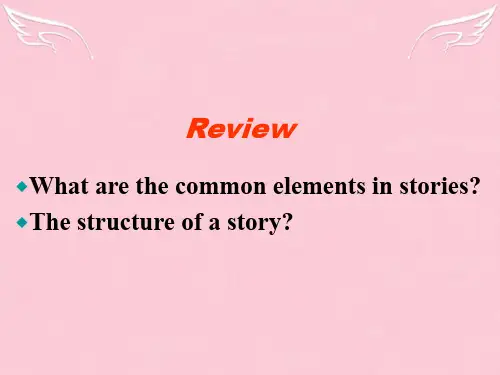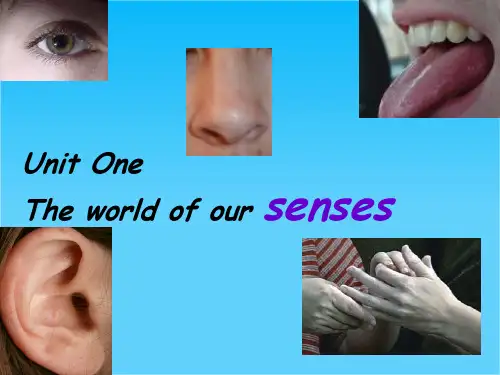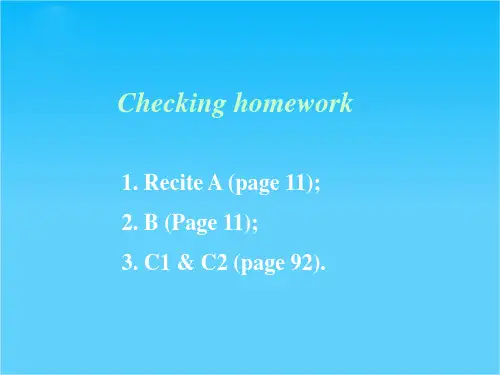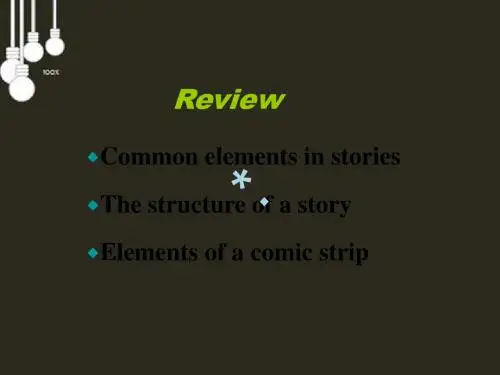(湖南专用)高中英语 Unit 1 The world of our senses单元质量评估(含解析) 牛津译林版必修3
- 格式:doc
- 大小:226.00 KB
- 文档页数:14

号顿市安谧阳光实验学校Module 3Unit 1 The world of our senses (1)I.词语辨析:1. glance / glare / stare / look:均可以解释为“看”,但有区别:glance:vi. / vt. 一瞥,看一眼,扫视,把眼睛投向……,后用介词:at, round, over, through.e.g. The teacher glanced round the class and found one boy sleeping. He glanced through the newspaper.She glanced down the list of names but didn’t find the one she wanted.glance one’s eyes + at / through / over / round …:匆匆看……e.g. I glanced my eyes over the ads to find a suitable job.glance off:一檫而过(没有打中)e.g. The ball glanced off my face and fell into the bushes.glance:n. 瞥视、略视,与at, into, through, over连用。
e.g. A glance at his face and you can tell he is telling a lie.take / give a glance at / over sth.瞄一眼……e.g. I took a glance at the TV programmes.glare:vi. 瞪着、怒视,与at, on 连用。
e.g. She rose, glaring at the rude waiter.The boy glared at the man, ready to fight. vi. 耀眼、炫目e.g. The sun glared down on us through the clouds.glare hate / hatred:带着仇恨的目光瞧着e.g. They glared hate / hatred at each other.stare:vi./ vt.:盯着看,目不转睛地看,凝视,与at连用。










Unit 1 The world of our sensesWord powerParts of speech & Describing the weatherTeaching Aims:●To learn more words about our senses●To complete the relevant exercises to consolidate itTeaching procedure:Step One: BrainstormingAsk students to do ex ercises to realize the fact that the same word has different parts of speech, so when using the word, they should pay attention.Look at the following sen tences and tell us the two meanings of the underlined word. Try to describe two parts of speech.1. Once out in the street, she walked quickly towards her usual b us stop.n. a place at which someone/something stops2.‘Here we are, King Stre et.’ he stoppedv. to p ut an end to what one is doing3. He met me in Park Street and walked me the rest of the way home.n. the remaining part4. That was nice of him. Why didn’t you invite him to come in and rest?v. relaxStep Two: Vocabulary LearningAsk them to do exercise and understand the word rest, once, left, stillMore exercises about sense, desert, time, present, dealStep Three: Work in pairFind the words listed bel ow in the s tory and complete the table. Then make different sentences with the words.Step Four: PracticeDescribing the weatherWhat words do you use to describe different kinds of weather?Read the conversation in Part A on Page 7.Adjectives:cloudy, sunny, cold, cool, warm, hot, dry, wet, rainy, snowyNouns:rain, snow, wind, storm, showerDiscussion1.What kinds of weather do you prefer? And why?2. Forecast the weather of tomorrow. You can discuss with your partner.Step Five: HomeworkFind more words with different parts of speech.Try to find more words with different parts of speech.Do exercises on P91. Talk about different kinds of weather in different seasons and places.。
(湖南专用)高中英语 Unit 1 The world of our senses单元质量评估牛津译林版必修3(120 minutes150 marks)PartⅠListening Comprehension(30 marks)Section A (22. 5 marks)Directions:In this section,you will hear six conversations between two speakers. For each conversation,there are several questions and each question is followed by three choices marked A,B and C. Listen carefully and then choose the best answer for each question.You will hear each conversation TWICE.1. Where does this conversation take place?A. On a plane.B. On a bus.C. On a train.2. Why is the woman travelling?A. She is travelling on holiday.B. She is travelling on business.C. She is travelling to give some lectures.3. What did the man do after leaving the lecture hall yesterday afternoon?A. He went to a speech.B. He went to the library.C. He went to the classroom.4. Where was the woman yesterday afternoon?A. In the reading room.B. In the library.C. In the lecture hall.5. What happened to the man?A. He failed his final test.B. He was out of work.C. He gave the students a hard final test.6. How was the man‟s feeling to the woman?A. Disappointed.B. Friendly.C. Grateful.7. When will the folk-custom activity be organized?A. This weekend.B. At the end of this month.C. Early next month.8. How will the two speakers get the money for costumes?A. By collecting 10 yuan from each family.B. By getting sponsorship from a travel agency.C. By letting each participant prepare their own costumes.9. Who will attend the performance in the community?A. The retired people.B. Everyone.C. The young people.10. What will the man do tomorrow?A. Take an exam.B. Hand in a paper.C. Attend a lecture.11. What does the man suggest that they do after dinner?A. Go to the Grill.B. Go to the library.C. Go swimming.12. What do we know about the man?A. He will be at the Grill at about 6:00.B. He will help Jane do her paper.C. He will go swimming after class.13. How did the woman get the skirt?A. She bought it.B. It was a gift given by her parents.C. It was made by herself.14. What did the woman do yesterday?A. She went out to buy some cloth.B. She went shopping with her mum.C. She went out to buy some clothes.15. What can we learn fr om the man‟s last sentence?A. He thinks the woman is excellent.B. He thinks the woman has a good judgme nt.C. He thinks the woman should be a tailor.Section B (7. 5 marks)Directions:In this section,you will hear a short passage. Listen carefully and then fill in the numbered blanks with the information you have heard. Fill in each blank with NO MORE THAN THREE WORDS.You will hear the short passage TWICE.Title:My most dreadful working experienceWork place:In 16Description:Hard work,poor pay and 17working conditionsMain demands of the work:18Working hours per night:19Total working time there:20PartⅡLanguage Knowledge(45 marks)Section A (15 marks)Directions:For each of the following unfinished sentences there are four choices marked A,B,C and D. Choose the one that best completes the sentence.21. His uncle went abroad in 2010,and since then.A. has not been heard ofB. had not been heard ofC. had not heard ofD. has not heard of22. —I‟m trying to find yesterday‟s news paper. Have you seen it?—I‟m afraid that I it away. I thought you had finished reading it.A. threwB. had thrownC. throwD. will throw23. He is a man with rich experience,from much can be learned.A. whomB. whichC. whereD. who24. He yet,otherwise he would have come to see me.A. mustn‟t have arrivedB. must have arrivedC. can have arrivedD. can‟t have arrived25. The old man,abroad for twenty years,is on the way back to his motherland.A. to workB. workingC. to have workedD. havi ng worked26. We don‟t have enough money. ,we cannot afford to buy the new car.A. BesidesB. HoweverC. OtherwiseD. Therefore27. Mary as well as three of her classmates invited to the party last night.A. wereB. has beenC. wasD. had been28. she had time to realize what was happening,she was hit on the head.A. SinceB. BeforeC. WhenD. Until[29. If I had tried my best last term,I more progress then.A. could madeB. would makeC. will have madeD. could have made30. Stand here you‟ll be able to see the blackboard better.A. butB. tillC. andD. or31. Evidence has been found through years of study children‟s early sleeping problems are likely to continue when they grow up.A. whyB. howC. whetherD. that32. The boy was observed basketball at eight o‟clock yesterday evening.A. playingB. playC. to playD. having played33. The house rent is high. I‟ve got about half the space I had at home and I‟m paying _______ here.A. as three times muchB. as much three timesC. much as three timesD. three times as much34. (2013·广州高一检测)It was not until dark he found that it was the correct way to solve the problem.A. thatB. whatC. whichD. when35. (2013·嘉峪关高一检测)It‟s beyond description. Nowhere else in the world_______ such a quiet beautiful place.A. can you findB. you can findC. find you canD. can find youSection B (18 marksDirections:For each blank in the following passage there are four words or phrases marked A,B,C and D. Fill in each blank with the word or phrase that best fits the context.We were the only family with children in the restaurant. I sat my infant son Eric in a high chair and noticed everyone was quietly eating and talking. Suddenly,Eric screamed with36and said,“Hi,there. ”His fat baby hands hit the high chair tray,and his eyes were wide with excitement.I looked around and saw the37of his enjoyment. It was an old man with a worn and oily coat. And his hair was uncombed and unwashed. I was sure he38. His hand waved. “Hi,there,baby;I see you,”the man said to Eric.My husband and I39looks. Eric continued to laugh and answer,“Hi,there. ”Everyone in the restaurant noticed this. My husband and I were embarrassed.We finally got through the meal and40the door. My husband went to pay the check and told me to meet him in the parking lot. The old man sat between m e and the door. “Lord,just let me out of here before he speaks to me or Eric,”I prayed. As I drew closer to the man,I turned my back trying to sidestep him and avoid any air he might be41. As I did so,Eric leaned over my arm,reaching with both arms in a baby‟s“pick-me-up” position. Before I could stop him,he had42himself to the man‟s arms. Eric,in an act of total43,and love,laid his tiny head upon the man‟s torn shoulder.His44hands full of dirt,pain and hard labor gently,so gently,cradled my baby‟s waist and patted his back.I stood amazed. After a while,he pushed Eric from his chest45as though he were in pain,saying “God bless you,ma‟am. You‟ve given me the best Christmas gift. ”I had just witnessed a genuine(pure or true)love shown through the innocence of a tiny child who saw no sin,who made no46. The ragged old man,unknowingly,had reminded me that a genuine love is one in which the true meaning of love is47.36. A. surprise B. delight C. anger D. nerve37. A. source B. reasonC. effectD. resource38. A. smiled B. mopped C. smelled D. wiped39. A. consulted B. exchangedC. separatedD. replaced40. A. ran for B. headed forC. sent forD. accounted for41. A. breathing B. fighting C. creating D. holding42. A. thrown B. devoted C. driven D. jumped43. A. independence B. desireC. trustD. dignity44. A. allergic B. strongC. smartD. aged45. A. eagerly B. violentlyC. gladlyD. unwillingly46. A. judgment B. decisionC. conclusionD. choice47. A. sharpened B. refreshedC. realizedD. learnedSection C (12 marks)Directions:Complete the following passage by filling in each blank with one word that best fits the context.Amy used to go to the gym three times48week,but she doesn‟t work49any more. In order to lose weight,she is taking weight-loss pills called Fat-less. 50she‟s becoming slimmer and slimmer,sometimes she feels tir ed and weak. Now she‟s in hospital recovering51liver failure. She regrets taking those weight-loss pills because they contain52harmful chemical53caused her liver to fail. Fortunately,Li Dong,a stranger,donated more than half of his liver to save54life.As a mattet of fact,we should not be embarrassed about our weight. After all,nothing is55important than health.Part ⅢReading Comprehension(30 marks)Directions:Read the following three passages. Each passage is followed by several questions or unfinished statements. For each of them there are four choices marked A,B,C and D. Choose the one that fits best according to the information given in the passage.AYou can improve your child‟s hearing memory considerably(在很大程度上). Once his hearing memory has been greatly improved,he‟ll be able to use and remember what he listens to in class. The success of these suggestions depends upon your ability to use your child‟s natural desire to get involved in games he finds simple and funny.A good way to begin is to read aloud a sentence from a book suitable for your child‟s reading age. Then ask your youngster to repeat the sentence back to you correctly. Next,reread the sentence,leaving out a particular word. See if your child can identify(识别)the word you left out. At the beginning use only simple sentences. Gradually,increase the length of the sentences. Make sure you don‟t rush things along too quickly,or your child may become discouraged and tired of the game.Take your child to go shopping with you often. He‟s to remember a list of items you want to buy in the supermarket. First,ask him to remember only a few things. Then,as he shows increased ability to remember,make the list longer and longer. Praise him often and warmly when he shows increased ability to remember things. He‟ll become proud of his“good” memory and will happily play the game.Encourage your child to learn easy and short poems. As his ability to do this becomes stronger,encourage him to remember longer poems. Do the same with songs.56. The suggestions will be successful if.A. you find simple and funny games for your childB. you can stimulate(激发)your child‟s interest in the activityC. you force your child to get involved in more practiceD. you improve your own hearing memory first57. The purpose of asking your child to repeat what you say is.A. to practice his pronunciationB. to develop his reading skillsC. to help him remember what he hearsD. to play a simple game he may find fun58. The third paragraph mainly talks about.A. another way to improve your child‟s hearing memoryB. why you should take your child to go shopping with youC. how to remember the items you want to buyD. the way you help your child do the shopping59. Who are the supposed readers of this passage?A. Children.B. Parents.C. Teachers.D. Psychologists.60. The last sentence …Do the same with songs‟means you should encourage your child to learn and remember.A. songs in the same way as he does with poemsB. poems in the same way as he does with songsC. the poems and songs which are similar in meaningD. those songs that have the same meaning as poemsBMany people believe the glare from snow c auses snow blindness. Yet,with dark glasses or not,they findthemselves suffering from headaches and watering eyes,and even snow blindness,when exposed to several hours of “snow light”.The United States army has now determined that glare from snow does not causesnow blindness in troops in a snow-covered country. Rather,a man‟s eyes of ten findnothing to focus on in a broad space of snow-covered without-grass land. So his gaze continually moves and jumps back and forth over the entire landscape in search of something to look at. Finding something,hour after hour,the eyes never stop searching and the eyeballs become tired and the eye muscles ache. Nature makes up for this discomfort by producing more and m ore fluid(液体)which covers the eyeball. The fluid covers the eyeball in increasing quantity until it makes eyes difficult to see clearly,and the result is total,even though for a short time,snow blindness.Experiments lead the army to a simple method of overcoming this problem. Scouts(侦察员)ahead of the troops are trained to shake snow from evergreen bushes,creating a dotted line as they cross completely snow-covered landscape. Even the scouts themselves throw lightweight,dark-colored objects ahead on which they can focus too. The men following can then see something. Their gaze is arrested. Their eyes focus on a bush and having found something to see,stop searching the snow-blanketed landscape. By focusing their attention on one object at a time,the men can cross the snow without becoming hopelessly snow-blind or lost. In this way the problem of crossing a continuous white land is overcome.61. To prevent snow blindness caused by the strong light from snow,wearing glasses or not.A. depends on whether the snow is white enoughB. makes no differenceC. makes much differenceD. depends on whether the snow is thick62. When the eyes are tired,tears flow out.A. to clear the visionB. to make the eyes stop searchingC. to make the vision unclearD. to produce more and more liquid63. Snow blindness can be prevented by.A. moving one‟s gaze back and forthB. walking ahead and keeping looking aroundC. making up for the discomfort of one‟s eyesD. providing the eyes with something to focus on64. What is the probable meaning of the underlined part “Their gaze is arrested. ”?A. They get something to look at.B. They can only look at one spot.C. Their eyes are clear.D. They can‟t see freely.65. A suitable title for this passage would be.A. Snow blindness and How to Overcome ItB. Nature‟s Cure for Snow blindnessC. Soldiers in the SnowD. Snow VisionCA young and successful executive(经理)was traveling down a neighborhood street,going a bit too fast in his new car. He was watching for kids darting(猛冲)out from between parked cars and slowed down when he thought he saw something.As his car passed,one child appeared,and a brick smashed into(猛撞)the car‟s side door. He slammed(踩)on the brakes and drove the car back to the spot from where the brick had been thrown.He jumped out of the car,grabbed the kid and pushed him up against a parked car,shouting,“What was that allabout and who are you?Just what are you doing?”Building up a head of steam,he went on,“That‟s a new car and that brick you threw will cost a lot of money. Why did you do it?”“Please,mister,please,I‟m sorry. I didn‟t know what else to do!”said the youngster.“It‟s my brother,”he said. “He fell out of his wheelchair and I can‟t lift him up. ”Sobbing(啜泣),the boy asked the executive,“Would you please help me get him back into his wheelchair?He‟s hurt and he‟s too heavy for me. ”Moved beyond words,he lifted the young man back into the wheelchair and took out his handkerchief and wiped the scrapes(擦伤)and cuts,checking to see that everything was going to be okay.“Thank you,sir. And God bless you,”the grateful child said to him. The man then watched the little boy push his brother to the sidewalk towards their home.It was a long walk back to his car. He never did repair the side door. He kept the dent(凹痕)to remind himself not to go through life so fast that someone has to throw a brick at you to get your attention:Life whispers in your soul and speaks to your heart. Sometimes,when you don‟t have the time to listen. . . Life throws a brick at your head. It‟s your choice—Listen to the whispers of your soul or wait for the brick!66. Why did the boy throw a brick at the car?A. He did it carelessly.B. He didn‟t like the car.C. He needed someone to lift his brother up.D. He dashed out from between two parked cars.67. Which word can replace the underlined sentence “Building up a head of steam”?A. Angrily.B. Luckily.C. Gratefully.D. Happily.68. Why did the young executive keep the dent?A. Because he didn‟t have money.B. Because he didn‟t care about the dent.C. Because he was afraid that a brick was thrown again.D. Because the dent could remind himself not to go through life so fast.69. According to the passage,which one is TRUE?A. The young executive was always going fast.B. The young executive drove the car ahead to the spot.C. The kid‟s brother wa s too heavy for him to lift him up.D. The young executive walked to his car quickly.70. What‟s the best title of the passage?A. A Young ExecutiveB. The Brick in LifeC. An Unlucky KidD. A Young Man Who Needed HelpPart ⅣWriting(45 marks)Section A (10 marks)Directions:Read the following passage. Fill in the numbered blanks by using the information from the passage. Write NO MORE THAN THREE WORDS for each answer.In the past,man did not have to think about the protection of his environment. There were not many people on earth,and natural resources seemed to be unlimited.Today,things are different. The world has become too crowded. We are using up our natural resources too quickly,and at the same time we are polluting our environment with dangerous chemicals. If we continue likethis,human being on earth will not survive.Everyone realizes today that if too many fish are taken from the sea,there will soon be none left. Yet,with modern fishing methods,more and more fish are caught. We know that if too many trees are cut down,forests will disappear and nothing will grow on the land. Yet,we continue to use bigger and more powerful machines to cut down more and more trees.We realize that if rivers are polluted with waste products from factories,we will die. However,in most countries waste products are still put into rivers or into the sea,and there are few laws to stop this.We know,too,that if the population of the world continues to rise at the present rate,in a few years,there will not be enough food.What can we do to solve these problems?If we eat more vegetables and less meat,we will easily get more food. Land that is used to grow crops can feed five times more people than land where animals are kept.The world‟s population will not rise so quickly if people use modern metho ds of birth control.Finally,if we educate people to think about the problems,we shall have a better and cleaner living place in theSection B (10 marks)Directions:Read the following passage. Answer the questions according to the information given in the passage.Playing is serious business for children. In fact,it‟s what they do best!Ask them why they do it,and kids will probably say,“Because it‟s fun!”But it‟s much more than that. It‟s also good for them.Studies show that from birth babies begin learning through play. They use their five senses to get to know their new world. Touching allows them to discover how different things feel. Brightly colored toys and clothing help develop a baby‟s sense of sight.When small children choose which toy to play with,they begin developing their abilities in making decisions. Children love toys that allow them to use their imagination. Sometimes an empty box is more fun than a high-tech toy. That‟s because a box can become anything a child imagines it to be.Crayons,paints and Play-Doh(彩色塑泥)are also good because they allow children to create. Traditional building blocks teach important pre-math skills like problem-solving.Playing doesn‟t become any less important once children start school. Many valuable lessons about life a re learned on the school playground. Kids learn how to share,take turns and play by the rules.81. What can children do best in their childhood?(No more than 1 word)____________________________________________________________________82. What help develo p a baby‟s sense of sight according to the passage?(No more than 5 words)____________________________________________________________________83. When do the children begin developing their abilities in making decisions?(No more than 10 words)____________________________________________________________________84. What kind of toys do children love?(No more than 6 words)____________________________________________________________________Section C (25 marks)Directions:Write an English composition according to the instructions given below.(2013·聊城高一检测)最近,关于南京13位爱心妈妈对一个重症弃婴的关爱事迹的报道让我们关注到一个特殊的群体——爱心妈妈群。